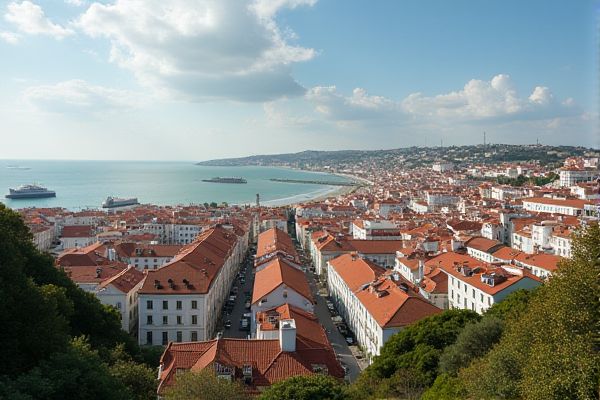
Shopping and retail options in Portugal: Expansive mall options including Colombo and El Corte Ingles. Variety of local markets for fresh produce. Popular international brands widely available. Traditional handicrafts in specialty shops. Tax-free shopping for eligible tourists. Sunday closure for most retail stores. Bargaining common in flea markets. Online shopping trusted among locals. Seasonal sales in January and July. Specialized shops for wine and olive oil.
Expansive mall options including Colombo and El Corte Inglés.
Colombo Shopping Centre is the largest mall in Lisbon, featuring over 300 stores, 60 restaurants, and a cinema, with a mix of high-street, local, and luxury brands. El Corte Ingles is a prominent department store offering a gourmet food market and various international and luxury brands, making both destinations top choices for shopping in Lisbon.
Variety of local markets for fresh produce.
In Portugal, particularly in Lisbon, there are several vibrant local markets offering a wide variety of fresh produce, such as Mercado da Ribeira, Mercado de Arroios, and Mercado de Campo de Ourique, each providing authentic shopping experiences with fresh fruits, vegetables, meats, fish, and local specialties. These markets maintain traditional atmospheres while some, like Mercado da Ribeira, also incorporate modern elements like food courts and gourmet dining options.
Popular international brands widely available.
While the article primarily focuses on Portuguese fashion brands, it mentions that international brands are also prevalent in Portugal. For example, Bella Hadid was spotted wearing a Dolce & Gabbana dress, indicating the presence and influence of global fashion brands in the Portuguese market.
Traditional handicrafts in specialty shops.
In Lisbon, Portugal, shoppers can explore a variety of historic and specialty shops that beautifully encapsulate the essence of Portuguese culture and craftsmanship. A Vida Portuguesa is one such notable destination, offering traditional crafts including ceramics, woolens, linens, and stationery. Other remarkable stores include Caza das Vellas Loreto, where you can find exquisite candles, and Luvaria Ulisses, which is renowned for its handcrafted gloves. Additionally, Principe Real Enxovais is well-known for its fine linens and embroidered textiles. These specialty shops not only offer unique goods but also provide a window into Portugal's rich cultural heritage and the enduring quality of its artisanal traditions.
Tax-free shopping for eligible tourists.
To be eligible for tax-free shopping in Portugal, tourists must spend a minimum of EUR61.50 in a single store and purchase goods for private use to take back to a non-EU country. It is essential to obtain a Customs export validation stamp within three months of the purchase. The goods must be unused, and this validation can be done at EU departure points such as airports. With the validation, the refund is available in cash or via credit card. For more detailed information on this process, visit the Vatfree website.
Sunday closure for most retail stores.
In Portugal, a proposal to close retail stores on Sundays and public holidays is being discussed in Parliament. The Portuguese Association of Shopping Centres has warned that such restrictions would have a "drastic impact" on economic activity and lead to job losses. Meanwhile, proponents argue that this change could improve work-life balance for retail staff. For more detailed insights, you can read the full article on the Essential Business website.
Bargaining common in flea markets.
Bargaining is not only encouraged but almost expected in Portuguese flea markets, such as Feira da Ladra and Mercado De Santa Clara, where visitors can negotiate prices, especially when purchasing multiple items. For more insights into this vibrant culture, check out this guide on Portuguese Flea Markets.
Online shopping trusted among locals.
In Portugal, the most trusted online shopping sites among locals include Worten, a Portuguese chain known for electronics and home appliances. This is closely followed by Aliexpress and Fnac, which offer a wide range of products. OLX stands out as the most popular overall for various second-hand and new items; however, it is not typically regarded as a traditional online shop. For more insights into these platforms, you can explore online shopping in Portugal.
Seasonal sales in January and July.
In Portugal, the tradition of sales thrives even without legally prescribed periods, with widely observed Winter and Summer Sale Periods. The Winter Sales typically span from December 26 to mid-February. Similarly, the Summer Sale Period generally extends from the end of June to mid-September. Nonetheless, certain shops may begin their summer sales as early as mid-June, officially launching from the latter half of July until September 15. This flexible approach allows shoppers to enjoy significant discounts across various retail sectors during these customary sales periods.
Specialized shops for wine and olive oil.
In Portugal, specialized shops like Loa - The Olive Oil World in Lisbon offer a curated selection of high-quality olive oils from various PDO regions, providing a sensory experience and educational resources for consumers. While wine shops are plentiful, olive oil specialized stores are rare. For more insights into this unique establishment, explore the offerings at The Olive Oil World, which stands out as a beacon for olive oil enthusiasts seeking authenticity and quality.
